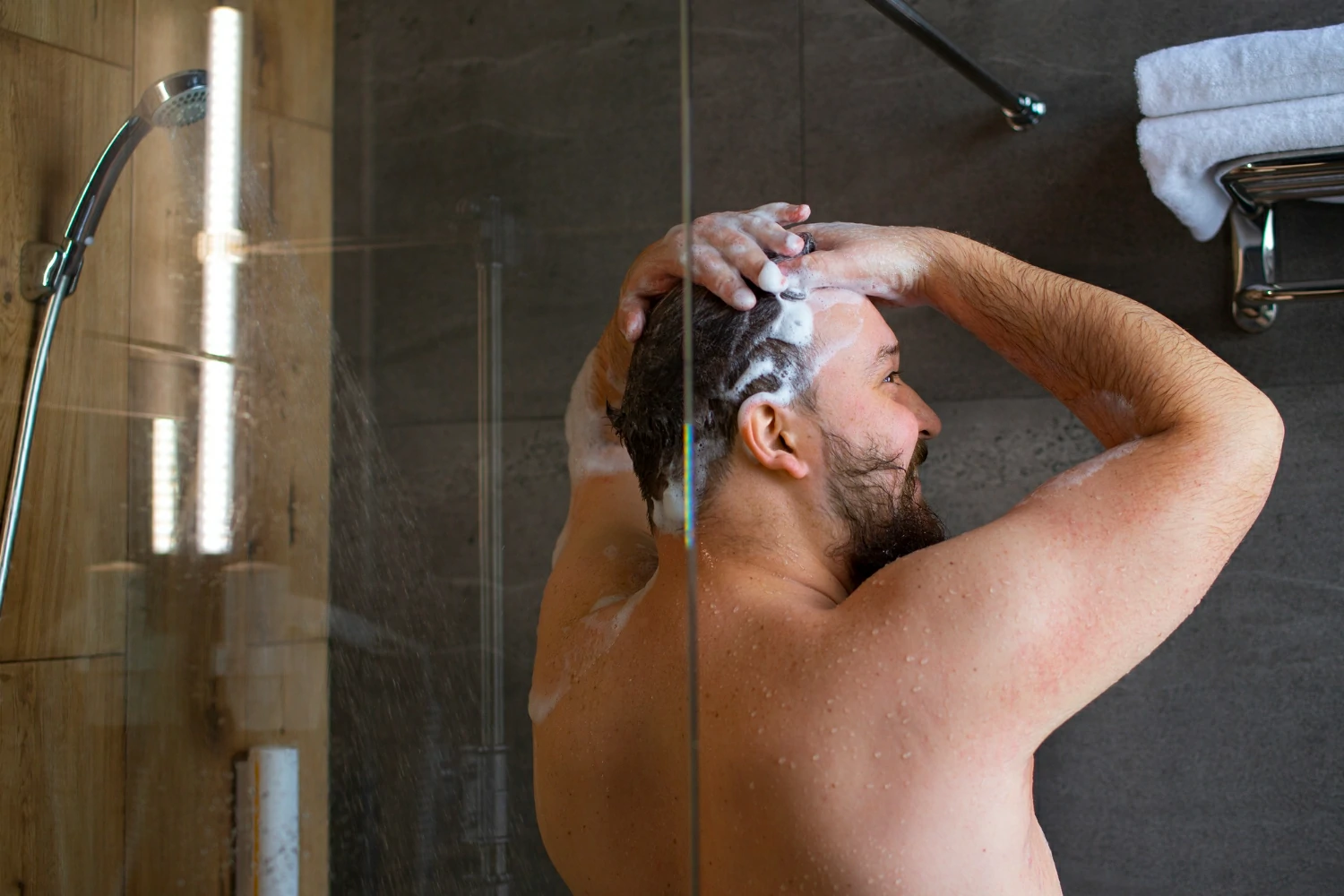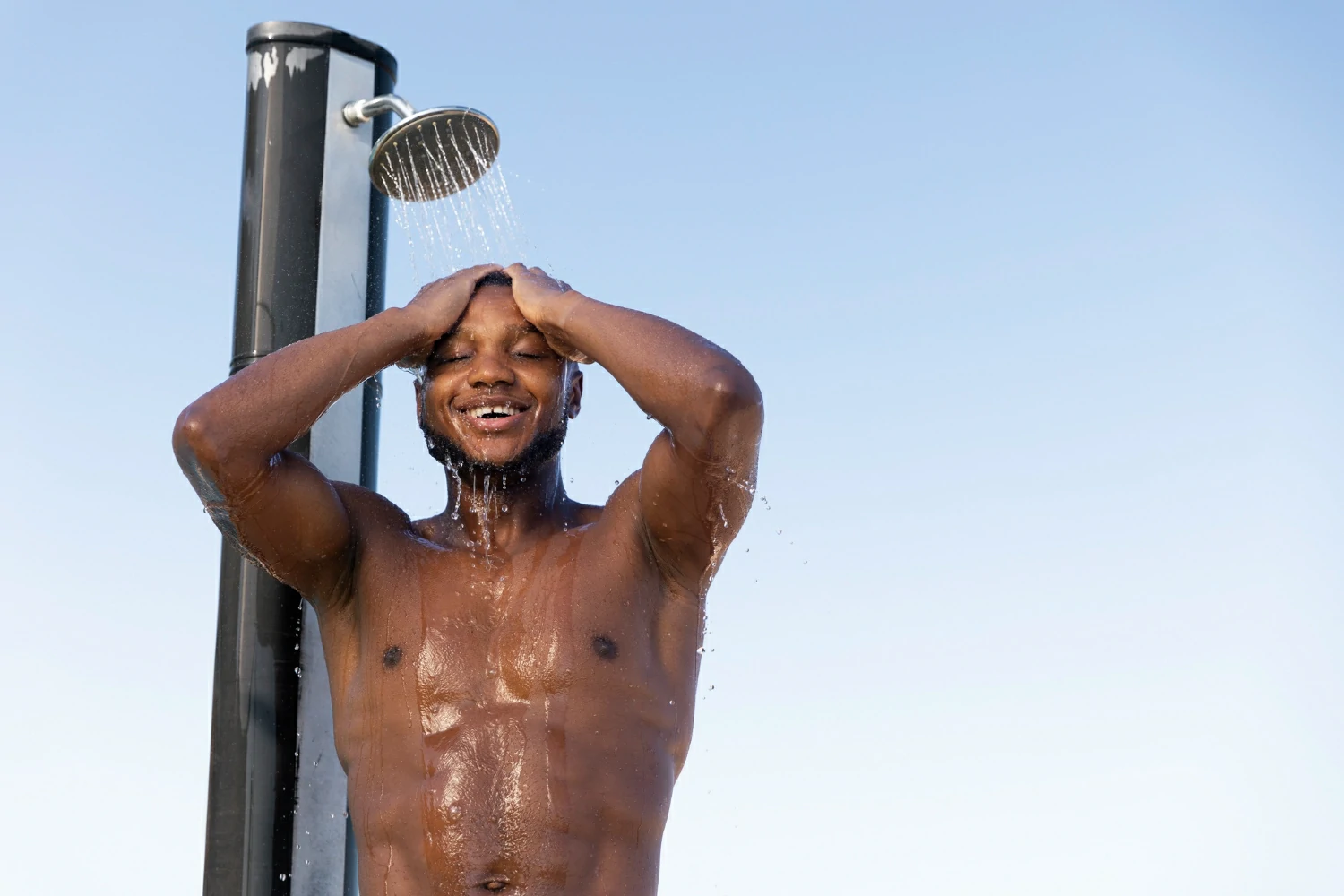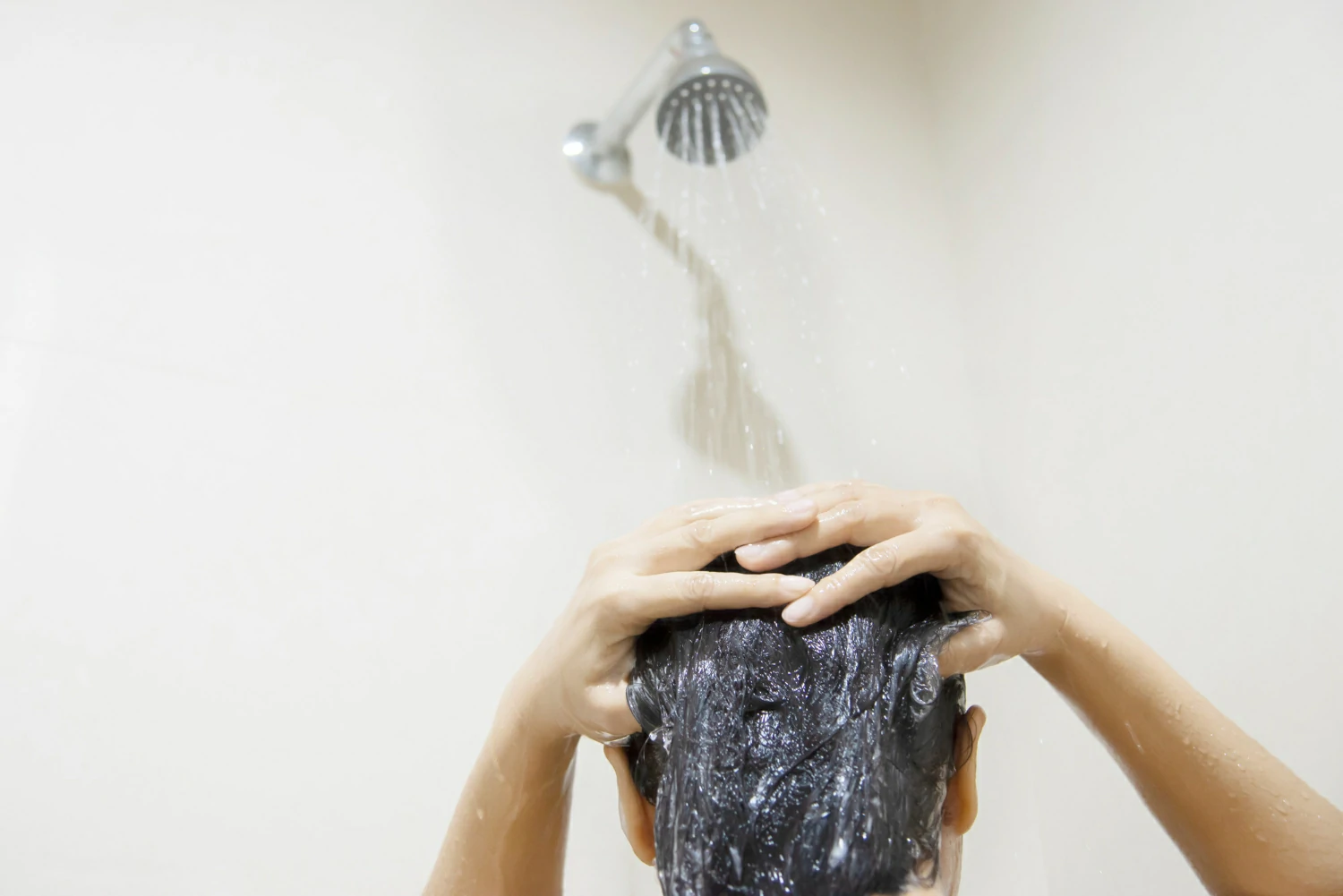How to shower and stay clean on the road? Answer is – Staying clean while traveling can be a challenge, especially if you’re on the road for extended periods. Whether you’re a road tripper, live in a van, or find yourself in situations without regular shower access, there are clever ways to stay fresh and clean. Options include utilizing gyms, truck stops, campgrounds, portable showers, and good old-fashioned sponge baths. A little planning and the right supplies will keep you feeling your best while on the move.
Summary
- Showering options on the road include gyms, truck stops, campgrounds, and portable solar showers.
- “Bird baths” or sponge baths are effective ways to clean up when water is limited.
- Wet wipes, dry shampoo, hand sanitizer, biodegradable soaps, and microfiber towels are essential hygiene tools for travelers.
- Odor control strategies are important for maintaining a sense of freshness.
- Staying clean on the road requires flexibility and a redefining of personal hygiene standards.
Staying Fresh on the Go

The importance of staying clean on the road
Maintaining good hygiene while traveling isn’t just about looking and smelling your best – it’s vital for your physical and mental well-being.
When you’re on the road, whether for a short road trip or an extended nomadic adventure, your body is exposed to a range of environments and potential contaminants. Staying clean helps to:
Prevent illness: Road trips often involve close quarters, shared spaces, and exposure to new germs. Regular cleaning reduces the spread of bacteria and viruses, keeping you healthier.
Boost confidence: Feeling fresh and clean contributes to an overall sense of well-being and can make you feel more comfortable and confident in social situations or while exploring new places.
Manage skin health: Sweat, grime, and environmental pollutants can clog pores and irritate the skin. Proper cleansing helps maintain healthy skin, especially if you’re prone to acne or other conditions.
Enhance comfort: Nothing feels quite as refreshing as cleaning up after a long day of travel, especially if you’ve been hiking, camping, or spending time outdoors.
Challenges faced by travelers regarding hygiene
Staying clean on the road presents unique obstacles that require some creativity and resourcefulness to overcome. Here are some of the common challenges:
Limited access to showers: Traditional shower facilities might not always be readily available, especially if you’re boondocking, relying on rest stops, or traveling to remote areas.
Water conservation: Many travel situations, particularly van life or extended camping, require careful water management. Full showers may not be feasible every day.
Small spaces: Cleaning yourself thoroughly can be tricky in the cramped quarters of a car, van, or RV.
Varying weather conditions Extreme temperatures, rain, and unpredictable weather can complicate your hygiene routine.
Public facilities: Relying on shared restrooms and showers at gyms, truck stops, or campgrounds can present concerns about cleanliness and availability.
Sarah Wilson Expert Opinion
Sarah Wilson, seasoned travel blogger and author of The Road Trip Survival Guide, emphasizes the importance of adapting your hygiene expectations on the road: “It’s crucial to remember that ‘clean’ on a road trip might look different than at home. Focus on the essentials, be resourceful, and a little flexibility goes a long way!”
How to Shower on the Road

1. Gyms
Gyms, especially national chains, offer a convenient and reliable way to access showers while traveling. They’re a haven for road-weary travelers seeking a refreshing clean-up, particularly those who enjoy a good workout before hitting the shower.
National chains with shower facilities
Several major gym chains across the US and internationally provide clean shower facilities and often other amenities like changing rooms, lockers, and towel services:
Anytime Fitness: This 24-hour gym chain is ubiquitous, with locations in many cities and even smaller towns.
Planet Fitness: Known for its budget-friendly memberships and welcoming atmosphere.
YMCA: A community-focused organization often offering various programs and facilities, including showers.
24 Hour Fitness: As the name suggests, many locations offer around-the-clock access for flexible workout and shower schedules.
Cost and membership options
Here’s a breakdown of how to access gym showers while on the road:
Full Membership: For frequent travelers or those wanting a regular workout routine, a full gym membership could be the most cost-effective option. Many chains offer nationwide access, giving you flexibility across multiple destinations.
Day Passes or Guest Passes: A great choice for one-time use. Contact the gym in advance to inquire about day pass rates and availability.
Free Trials: Some gyms offer free trials, ranging from a day to a week, allowing you to test out the facilities, including the showers.
Reciprocity: If you’re already a member at a gym like the YMCA, check if they have a reciprocity program allowing you to use facilities at other locations.
Mark Thompson Expert Opinion
Mark Thompson, an avid van-lifer and fitness enthusiast, shares his experience: “National gym chains have been a lifesaver on the road. A monthly membership gives me a place to work out, shower, and recharge. It’s been worth every penny.”
2. Truck stops
Truck stops are a true oasis for weary travelers, offering not just fuel and food, but also the valuable commodity of a hot shower.
Designed primarily for long-haul truckers, these facilities are increasingly welcoming and accessible to all kinds of road warriors.
Paid shower facilities for travelers
Truck stop showers are typically private rooms, often more spacious than gym showers. Here’s what you can generally expect:
Individual Stalls: Each stall usually includes a shower, toilet, sink, and bench area, offering privacy and space to spread out your toiletries.
Towels and Basic Amenities: While some truck stops provide towels and soap, it’s always a good idea to bring your own in case supplies run low.
Cleanliness: Standards vary between locations. Reading online reviews (see below) can help you make informed choices.
Cost: Expect to pay around $10-$15 for a shower. Some chains offer loyalty programs or shower credits with fuel purchases, reducing the overall cost.
Finding truck stops with showers
Major truck stop chains that almost always offer shower facilities include:
Pilot Flying J: One of the largest chains in the US, with a reputation for clean facilities.
Love’s Travel Stops: Another major player with convenient locations across the country.
TA/Petro Stopping Centers: A well-established chain, particularly strong in the Midwest and Eastern US.
Jessica Harmon Expert Opinion
Jessica Harmon, a cross-country road tripper known for her budget travel tips, notes: “Truck stop showers were a surprising find for me. They’re more affordable than I expected and a great way to refresh after several days of camping or driving.”
3. Campgrounds
Campgrounds, whether sprawling public parks or cozy private RV sites, are designed for travelers and often boast shower facilities as a staple amenity.
They’re an excellent option for those who enjoy the outdoors or want to combine their clean-up with a scenic overnight stay.
Public and private campgrounds with amenities
Let’s break down the types of campgrounds you might encounter:
National and State Parks: Many national and state parks offer campgrounds with varying levels of facilities. Sites within these parks often feature shower houses, though amenities can be more basic at less-developed campgrounds.
KOA (Kampgrounds of America): This network of private campgrounds is known for its family-friendly atmosphere and reliable amenities, including shower facilities.
Independent RV Parks and Campgrounds: These range from rustic to resort-style. Most RV parks cater to longer stays but often welcome tent campers and road trippers, typically providing shower access.
How to locate campground showers
Here are some resources to help you find your next campground shower:
Park Websites: State/National park and campground websites usually detail available facilities, including showers. Look for keywords like “shower house,” or “comfort stations.”
Campground Directories: Websites and apps that list campgrounds across the country:
- Campendium
- TheDyrt
- Recreation.Gov (Excellent for public campgrounds)
Phone call: For smaller campgrounds or to confirm details, a quick call is always the most reliable option.
Emily Peterson Expert opinion
Emily Peterson, an outdoor enthusiast and blogger at The Adventure Atlas, recommends: “Campground showers are a fantastic ‘reset’ point during a road trip. I plan a campground night with showers every few days to feel truly refreshed.”
4. Solar Showers

Solar showers harness the power of the sun to provide a surprisingly refreshing shower experience even in the most remote locations.
They’re a favorite amongst off-grid adventurers, van lifers, and anyone who prioritizes sustainable travel solutions.
Portable, eco-friendly showering options
Here’s why solar showers are an ingenious choice for road trips:
Self-sufficiency: No need for hookups or external power sources – perfect for boondocking or campsites without facilities.
Water conservation: They use a limited water supply, encouraging mindful water usage.
Environmental impact: Heating water with solar energy reduces your carbon footprint.
Versatility: Use them not just for showering but also for rinsing gear, dishes, or even a quick pet bath.
How solar showers work
The concept is brilliantly simple:
The Reservoir: A dark-colored bag (typically PVC) holds several gallons of water.
Solar Absorption: The bag’s color absorbs sunlight, passively warming the water inside throughout the day.
Pressurization: Some models have a foot pump or use gravity to create water pressure for the showerhead.
Shower Time: Hang the bag, attach the showerhead, and enjoy a warm spray!
Best models for road trips
Consider these factors when choosing a solar shower:
Capacity: Ranges from 2.5 to 10 gallons. Smaller capacities are easier to transport; larger ones are ideal for groups or longer showers.
Construction: Look for durable materials that can withstand the rigors of travel.
Features: Some models include pressure pumps, thermometers to monitor water temperature, and versatile showerheads.
Popular Brands:
Sarah Richards Expert Opinion
Sarah Richards, an experienced overlanding guide, states: “My solar shower has come to the rescue countless times. It’s amazing how a warm rinse at the end of a dusty day can completely change your outlook.”
5. “Bird Baths” or Sponge Baths
Sometimes, a full shower simply isn’t practical or possible while on a road trip. Whether you’re boondocking and conserving precious water supplies, facing limited facilities, or need a quick refresh between showers, the sponge bath is your go-to hygiene solution.
Conserving water with sponge baths
Sponge baths offer several benefits for road trippers:
Minimal water usage: They require only a small amount of water compared to traditional showers, helping travelers stretch limited resources.
Flexibility: You can take a sponge bath virtually anywhere – a campsite, rest stop restroom, or even inside your vehicle.
Resourcefulness: They remind us that staying clean doesn’t always require elaborate setups, promoting adaptability on the road.
Essential Supplies and Techniques
Here’s what you’ll need and how to make the most of your sponge bath:
Supplies
- Container: A small basin, bowl, or collapsible bucket to hold your water.
- Washcloths: Opt for soft, absorbent washcloths, ideally several for different body areas.
- Biodegradable soap: Choose an environmentally friendly, concentrated soap designed for travel.
- Warm water: If possible, use slightly warmed water for comfort. A sun-warmed water bottle or thermos can come in handy.
- Towel: A quick-drying microfiber towel is ideal for space-saving and efficient drying.
Optional
- Baby wipes or body wipes for a quick refresh between sponge baths.
- Dry shampoo to clean your hair without water.
Technique
Privacy: Locate a private spot within your vehicle, a restroom, or use a portable shower tent.
Prep Your Supplies: Fill your container with warm water and add a small amount of soap. Dampen a washcloth.
Target Zones: Wash in sections – face, arms, underarms, torso, legs, and feet. Use separate washcloths for your face and body.
Rinse: Dip a clean washcloth in plain water and wipe away soapy residue.
Dry Thoroughly: Towel off well to prevent chafing and skin irritation.
Mike and Anne Howard Expert Opinion
Mike and Anne Howard, authors of the blog HoneyTrek and seasoned world travelers, note: “Sponge baths have been a lifesaver during our long-haul travels. They teach us the importance of water conservation and the simple joy of feeling clean, even in minimalist circumstances.”
Tips
- Warm it up: Even slightly warm water significantly enhances the experience.
- Focus on high-impact areas: Target armpits, groin, and feet for maximum freshness.
- Air dry: When possible, allowing your skin to air dry fully can feel refreshing and prevent moisture build-up.
Tips for Staying Clean on the Road

While showers are crucial, other tools and techniques ensure all-around freshness when you’re traveling. Let’s look at some unsung heroes of road trip hygiene:
1. Wet Wipes and Body Wipes
These moist towelettes are your ultimate quick-clean solution, offering a multitude of benefits for road warriors:
Types of wipes and their uses
- Baby wipes: Gentle and fragrance-free, making them a versatile option for sensitive skin and cleaning more than just bottoms!
- Biodegradable wipes: A must-have for eco-conscious travelers. Look for brands specifically designed for camping and outdoor use, as regular wipes can take ages to break down.
- Makeup remover wipes: Perfect for cleaning up at the end of a long day and keeping your skin fresh.
- Antibacterial Wipes: Useful for wiping down surfaces like picnic tables, your car’s dashboard, or to sanitize your hands in a pinch.
Uses for wipes on the road
- Substitute for sponge baths: Use wipes to clean targeted areas when water is scarce.
- Quick refreshes: Wipe down your face, hands, underarms, etc., between showers to combat sweat and grime.
- Gear cleaning: Perfect for spot-cleaning camp chairs, cooking gear, or your travel mug.
- First aid: Clean minor cuts and scrapes when a sink isn’t readily available.
2. Dry Shampoo
This magical powder is a savior for those days when washing your hair isn’t an option. It soaks up excess oils, revitalizes hair, and adds a touch of fragrance for an instant pick-me-up.
How to use dry shampoo effectively
- Target Your Roots: Focus on applying dry shampoo at the scalp, where oils tend to concentrate.
- Massage it in: Work the powder through your hair with your fingers for even distribution and absorption.
- Brush it out: After a few minutes, thoroughly brush your hair to remove excess powder and create a natural look.
Choosing the right kind for your hair type
- Light vs. dark hair: Many dry shampoos come in formulations for both light and dark hair to prevent a powdery white residue.
- Aerosol vs. powder: Aerosol sprays offer easy application, while powders allow targeted precision.
- Natural options: Look for dry shampoos made with natural ingredients like arrowroot powder and essential oils for a gentler alternative.
3. Hand Sanitizer
A small bottle of hand sanitizer is an on-the-go cleanliness powerhouse, especially when soap and water access is limited.
Benefits of hand sanitizer
- Germ buster: Eliminates a high percentage of bacteria and some viruses when used correctly.
- Portable and convenient: Toss it in your backpack, glove compartment, or keep a pocket-size bottle on you.
- Prevents illness: Especially during travels, regular hand sanitizing decreases your risk of picking up unwanted germs.
Dr. Sarah Lewis Expert Opinion
Dr. Sarah Lewis, a travel medicine specialist, stresses: “Hand sanitizer is an essential part of any travel first-aid kit. Regular hand hygiene is one of the best defenses against the spread of illness, particularly when you’re on the road.”
4. Biodegradable Soaps
Choosing the right soaps makes a significant difference, both for your own hygiene and minimizing your environmental impact while traveling.
Why they’re important for the environment
Traditional soaps often contain harsh chemicals, such as phosphates or fragrances, that can disrupt fragile ecosystems when washed down the drain or used outdoors.
Biodegradable soaps, on the other hand, break down naturally without harming waterways or wildlife.
Best options for travel
- Dr. Bronner’s Castile Soap: This versatile, concentrated soap is a classic among outdoor enthusiasts. Dilute it for everything from body wash and shampoo to dishwashing.
- Campsuds: Another popular choice designed for camping and outdoor use.
- Biodegradable Bar Soaps: Many brands offer travel-size bars perfect for sponge baths or handwashing.
Tips
- Read the label: Look for soaps clearly labeled “biodegradable” and made with plant-based ingredients.
- Dispose of properly: Even with biodegradable soaps, avoid washing directly in lakes or streams. Dispose of soapy water away from water sources.
5. Microfiber Towels
These towels are a road tripper’s dream, combining quick-drying efficiency with compact storage, making them an upgrade over traditional towels.
Benefits of microfiber towels
- Absorbent: They soak up an impressive amount of water, despite their thinness.
- Quick-drying: They dry significantly faster than cotton towels, preventing mustiness and mildew.
- Space-saving: Microfiber towels pack down incredibly small, freeing up valuable space in your luggage.
- Odor-resistant: Their quick-drying properties make them less prone to developing funky smells.
- Multi-use: Use them as bath towels, washcloths, or even to clean up spills.
6. Odor Control
Road trips, especially extended ones, can sometimes lead to lingering odors in your vehicle or on clothing and gear. Here’s how to keep things smelling fresh:
Natural odor-neutralizing products
- Baking soda: Sprinkle it on carpets, car seats, or inside shoes to absorb unwanted smells.
- Vinegar: Diluted white vinegar in a spray bottle can neutralize odors on fabrics.
- Activated charcoal: Small pouches of activated charcoal placed in your car or near gear can absorb odors passively.
- Essential oils: A few drops of lavender or tea tree oil diluted in water make a refreshing natural air freshener.
Tips for keeping clothes and gear smelling fresh
- Air it out: Hang damp clothes or gear outside to dry thoroughly, preventing mildew buildup.
- Dirty clothes bag: Stash sweaty or soiled clothing in a designated bag (ideally airtight) to isolate odors.
- Moisture-wicking fabrics: Opt for quick-drying, breathable clothing that resists odor-causing bacteria.
- Footwear care: Air out shoes regularly, and use odor-absorbing insoles or powders.
Julia Parker Expert Opinion
Julia Parker, experienced hiker and founder of the outdoor gear blog Trailbound Adventures, recommends: “Packing a small spray bottle with diluted vinegar and essential oils is my go-to for combating travel smells. It’s a natural and effective way to freshen up my clothes and gear on the go.”
What does it mean to stay clean on the road?

Maintaining cleanliness on the road isn’t merely about physical appearances. It encompasses your overall well-being, sense of comfort, and how you choose to balance personal standards with the unique circumstances of travel.
1. Defining personal hygiene standards
Everyone has a different baseline for what makes them feel clean. Consider these questions to define yours:
Shower frequency: How often do you typically shower at home, and can that be adjusted realistically on the road?
Essential cleaning zones: What body areas do you prioritize cleaning, even during a quick wipe-down?
Odor awareness: How sensitive are you (and others traveling with you) to lingering body odor?
Hair care needs: Does your hair type require frequent washes, or can you embrace dry shampoo days?
Environmental standards: How important is using eco-friendly products and minimizing your impact?
2. Adjusting expectations based on your situation
Road trips come in all shapes and sizes. Your hygiene routine will likely adapt depending on:
Trip length: A weekend getaway has different needs than a multi-month van life journey.
Accommodation style: Tent camping will present different challenges than an RV with full amenities.
Activity level: Days spent hiking will demand a different approach than primarily driving or sightseeing.
Access to resources: Boondocking means more careful water management than staying at developed campgrounds with showers.
Personal resilience: Some travelers are more tolerant of temporary grime than others.
Nathan James Expert Opinion
Nathan James, a seasoned travel photographer who often spends weeks on the road, shares: “For me, staying clean is more about a mindset. It’s about being resourceful, knowing my body’s needs, and not stressing if I don’t look or smell like I just stepped out of my home shower.”
Conclusion
Staying clean on the road isn’t about replicating your home routine perfectly. It’s about resourcefulness, adaptability, and finding a balance between your hygiene needs and the ever-changing circumstances of travel.
Whether you’re utilizing gym chains, truck stops, campgrounds, or portable solar showers, there are always ways to access a refreshing clean-up.
Remember, tools like wet wipes, dry shampoo, hand sanitizer, biodegradable soaps, microfiber towels, and odor control strategies are invaluable allies in your hygiene arsenal.
Ultimately, staying clean on the road empowers you to feel your best, allowing you to focus on the adventure, the open road, and the unforgettable experiences that await.
FAQs
Q: I’m worried about conserving water while traveling, especially when boondocking. Any tips?
Absolutely! Here’s how to minimize water usage:
- Sponge baths: Your go-to solution, using minimal water for a full-body clean.
- Prioritize cleaning: Focus on high-impact areas (armpits, groin, feet).
- “If it’s yellow, let it mellow…”: An old saying, but relevant for conserving toilet flushes.
- Biodegradable wipes: Great alternative to showers on some days.
- Wash dishes efficiently: Use a two-basin method (one with soapy water, one for rinsing).
Q. Are there ways to do laundry on a road trip?
Yes! Here are several methods:
- Campground laundromats: Many offer coin-operated laundry facilities.
- Laundromats in towns: Do a quick online search for options along your route.
- Portable Scrubba wash bag: For handwashing small items on-the-go.
- Sink washing: Possible for lightweight clothing items if you have access to a sink.
- Air it out: Sometimes airing out clothes is enough to freshen them up for another wear.
Q. My skin gets irritated easily. Any tips for staying clean without harsh products?
Here’s how to protect sensitive skin on the road:
- Gentle products: Look for fragrance-free soaps, wipes, and shampoos.
- Dr. Bronner’s: A versatile option for many sensitive-skinned travelers.
- Patch test: Introduce new products on a small area of skin before full use.
- Spot-cleaning: Limit full-body showers or sponge baths on some days.
- Sun protection: Prevent additional irritation from sunburn.
Q. How do I keep my car smelling decent during a long road trip?
Proactive measures are key:
- Clean it out: Start with a decluttered, thoroughly cleaned vehicle.
- Baking soda: Sprinkle it under seats and in footwells to combat odors.
- Airflow: Crack windows periodically, even when the car is parked.
- Dirty clothes bag: Contain odors from sweaty or soiled clothing.
- Trash removal: Don’t let food wrappers or empty bottles linger.







